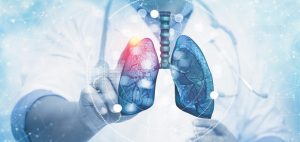 While the number of cases and the number of deaths from lung cancer have declined dramatically over the past decade, lung cancer is still the leading cause of cancer deaths in the United States in both men and women. According to the American Cancer Society, more people die of lung cancer in a year than from breast, prostate and colon cancer combined; however, there are several ways to reduce your risk of lung cancer.
While the number of cases and the number of deaths from lung cancer have declined dramatically over the past decade, lung cancer is still the leading cause of cancer deaths in the United States in both men and women. According to the American Cancer Society, more people die of lung cancer in a year than from breast, prostate and colon cancer combined; however, there are several ways to reduce your risk of lung cancer.
AN OUNCE OF PREVENTION . . .
Approximately 85% of all lung cancer occurs in people who smoke. So it stands to reason that one of the best ways to reduce your risk of getting lung cancer is to never begin smoking, or to stop smoking as soon as possible. Tobacco in all forms increases your risk of various types of cancer; chief among them is lung cancer. There are many programs to assist with smoking cessation. Discuss these options with your doctor to determine which method is best for you.
EARLY DETECTION SAVES LIVES
Although there have been some real advances in the treatment of lung cancer, the average five-year survival rate for lung cancer in the U.S. is only 18.6%, unless it is detected early, according to the American Lung Association. However, if the disease is detected early, while it is still localized within the lungs, the five-year survival rate soars to 56%. So your chances of surviving lung cancer are three times greater when it is detected early.
Unfortunately, only about 15% of all lung cancer cases are diagnosed at an early stage. Why? Because often in the early stages there are no real symptoms. That is one of the reasons why regular screenings are so important – especially if you are a current smoker or if you have ever been a heavy smoker for longer than 15 to 20 years.
Through the use of low-dose spiral CT scans of the chest, lung cancer can often be detected in its early stages before it becomes incurable, or even before a patient is showing symptoms. This type of screening can detect early stage cancers that cannot be seen on traditional chest X-rays. Screening is recommended for people with a history of heavy smoking, defined as 30 pack years or more. A pack year
means smoking an average of one pack of cigarettes per day for one year (for example: one pack per day for 30 years or two packs per day for 15 years). Check with your physician to see if you could benefit from a CT lung scan.
IMPROVEMENTS IN THE TREATMENT OF LUNG CANCER
Many advances in the treatment of lung cancer have occurred in the past decade, including the development of medications known as targeted therapies, which interfere with certain processes that cancer cells use to grow and spread, and immunotherapies, a type of targeted therapy that boosts the body’s immune system to fight cancer. These drugs have given oncologists many more options in treating lung cancer and have made treatment more effective and safer for patients.
LUNG CANCER RESEARCH INVESTIGATES MANY POSSIBILITIES
Many clinical trials are looking at newer combinations of chemotherapy drugs to determine which are the most effective. These are especially important for older patients who may have other health problems, and doctors are studying these combinations to discover if treatment outcomes can be further improved. Sometimes, chemotherapy is also being used in combination with some targeted therapies and has been shown to improve survival rates.
There is still much research needed to develop even more effective treatments for lung cancer; however, today many more people are surviving the disease than ever before.
World-Class Cancer Treatment Close to Home
Florida Cancer Specialists & Research Institute (FCS) has a statewide network of expert, board-certified physicians who bring world‐class cancer treatments to local communities, both large and small, in locations throughout Florida. FCS is also a strategic partner with Sarah Cannon, one of the leading research and clinical trial organizations in the world. This alliance provides FCS patients access to the newest, most innovative and most promising new treatments.
Florida Cancer Specialists treats patients with all types of cancer and offers a number of services, including an in-house specialty pharmacy, an in-house pathology lab, financial counselors at every location and 24/7 access to Care Managers, who help deliver the most advanced and personalized care in your local community.
Florida Cancer Specialists
North Port
1390 Grand Venture Drive
North Port, Florida 34286
Port Charlotte
22395 Edgewater Drive
Port Charlotte, FL 33980
Venice Island
901 South Tamiami Trail
Venice, FL 34285
Venice Healthpark
836 Sunset Lake Blvd,
Suite 101
Venice, FL 34292
Englewood
714 Doctors Drive
Englewood, FL 34223-3992
For more information, visit FLCancer.com









